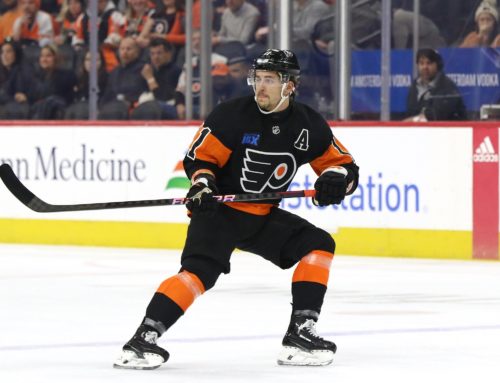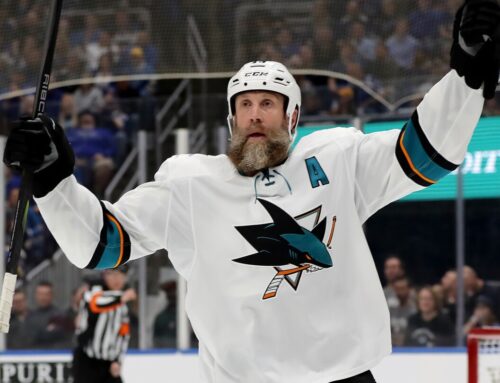According to Elliotte Friedman, Phil Kessel would like to play in 2023-24 and is not concerned about his ironman streak ending. Kessel suited up for just four playoff games during the Golden Knights' run to the Stanley Cup, but playoff games don't count in an ironman streak. However, his playoff deployment should probably foreshadow the fact that he won't be an everyday player if he signs somewhere. Kessel is the only player to have played 1,000 consecutive games (he's at 1,064), but it seems like this streak will come to an end this season.
The key to an ironman streak? Perhaps it is a lack of physical play; more specifically, hits. Kessel has not registered more than 12 hits in an entire season since 2014-15, his final season with the Leafs. Keith Yandle, the NHL's previous ironman, was not an overly physical player either, as his career high in hits was 53 – relatively low for a defenseman. Brent Burns, who has the next-highest active games streak at 761, might seem like an exception. However, Burns has not reached 100 hits in any of his past seven seasons.
–
According to the Associated Press, Patrick Kane said he's "kind of getting back to his old self" three months after hip surgery. Although he hopes to be cleared for contact soon, he plans to remain on the six-month rehabilitation schedule. That still puts him on track for the beginning of December. Expect him to have an NHL home by then, although he should only be drafted in deeper leagues at this point because of the possible 1–2-month absence and declining production (57 PTS in 73 GP last season). He will be a very popular waiver-wire add once he's ready to return, though.
–
To break in the month of September, I'm taking a bit of a left turn from my typical Ramblings. More specifically, I won't be breaking down any players, which will be for tomorrow and the next day. Instead, I'll discuss two topics that were brought up on Twitter (X still sounds strange) this week and expand on them here.
One such topic is ADPs (average draft positions). If you're not familiar with the acronym or term, it refers to the average pick that a player is chosen in a fantasy draft. This information is readily available on fantasy providers such as Yahoo and Fantrax. I believe that ADPs are important, but I also understand that they have their limitations.
Why they are important:
Understanding relative value is critical in winning your league. One of the ways that you can undermine your own draft performance is by reaching for players, especially reaching far. You don't want to pick a player in a particular round if they will be around five rounds later. Instead, pick a player that a) Likely won't be around for your next pick, and b) Is not overvalued in that spot, even if their ADP suggests they are normally drafted in that spot. Having a fantasy football draft recently has given me some recent practice with this concept.
Conversely, ADP is one measurement that you can use to determine whether you may be picking a player too early. If I have two similarly-ranked players according to the projections I'm using, and one has a significantly higher ADP than the other, then I will choose the player with the higher ADP. Or wait until later to choose the player with the lower ADP, who I believe will offer similar value. Or draft them both, if I desire to have both players on my roster and have the room.
I also like ADPs because they take information from the masses. Why ask just one person for their opinion when you tap into the behavior of thousands? That many people can't be subject to personal bias, such as picking Player A over Player B because Player A plays for your favorite team. You might feel more comfortable with your decision if it aligns with conventional wisdom.
Why they have their limitations:
An ADP is only as good as the scoring system that it assumes. If your league uses Yahoo default scoring settings (as many of their leagues probably do), then its ADP is likely a good match for your league. However, if your scoring system is much different in that it has a lot of other peripheral categories or is only a pure scoring league, then ADP will only go so far in terms of predicting success. If that is the case, then I'd advise investing in the Fantasy Hockey Geek, which will compile rankings specific to your league categories and other settings.
As well, ADPs generally also assume single-season leagues and may not work in some keeper formats. I would think that they still could matter in a limited keeper system, such as a keep 4. If you have an unlimited number of keepers and the draft is auction-based or there is no draft (ie. waiver madness), then ADPs are pretty well meaningless.
Also, ADPs can be slanted by the pre-draft rankings of the fantasy provider such as Yahoo, Fantrax, ESPN, or CBS. If a player is ranked too high or too low, then the ADP might not be adjusted right away. Over time it might, but fantasy managers will tend to go with the provider's rankings if they're not sure. Then the ADPs don't rise or fall the way they should.
–
A recent question to Dobber on Twitter where someone offered Andrei Vasilevskiy for the number one pick (which would be Connor Bedard) also motivated me to share my thoughts on vetoing trades.
My opinion: Vetoing trades should be done very rarely and with caution. As a commissioner, I don't believe in intervening in trades unless absolutely necessary, instead offering information to one or both owners in case they had missed anything important when consummating the deal.
If you do not think that a trade should pass, then by all means vote against it. However, trade vetoes should be used only if you believe collusion is involved – not if one team gets the better deal. Collusion isn't easy to prove absolutely, but it might surface if mutual benefit is lacking, one of the owners is unable to reasonably describe their intention for making the deal, and/or a team appears to be tanking without improving their team for future seasons.
Don't vote against trades simply because one team appeared to win the deal hands down or because a division rival is acquiring immediate help to make their team better. That might in the end discourage trades, not to mention create hostilities in your league and cause honest participants to leave. The possibility of backlash or revenge could also rear its ugly head should you make your own trade.
If you have voted against a trade, you should be allowed to publicly share your reasons for that. The owners that have agreed to the trade should also be allowed to respond to any comments. Dialogue will help get issues into the open, and it may lead to rule changes that might close any loopholes that anyone is trying to exploit. Just remember to keep your discussions civil and avoid personal attacks. This process will ensure that league members remain accountable for their actions.
An appeals system might be an option if a trade does not pass. Both owners would need to agree that they would like to appeal the decision and clearly state their reason(s) for making the deal. If so, the trade would go to a league-wide vote with majority rules, taking place over a set period (say 48 hours). This would also allow for a cooling-off period in case one of the owners second-guesses the trade, felt pressured to make the deal, or wasn’t familiar enough with the league to be making a blockbuster trade (as mentioned in Street Hockey Hasek’s example).
I felt the need to voice my take on vetoing because I recently had a trade appear in one of my leagues that two league members voted against. I didn't vote against the trade, but I did have questions for both teams because the benefit appeared to be heavily weighted toward one side. Both sides were able to explain their reasons for making the trade, even though I think there was still a clear winner to the deal. (I won't list the trade here, since a non-league member may have a difficult time understanding why the trade could be controversial without understanding the league rules.) The trade was allowed to pass, but I had to refresh myself on the rules for vetoing trades. After all, in the nine years I've been commissioner in this league, I can't recall one trade ever being vetoed.
–





 EDM
EDM BUF
BUF UTA
UTA NYI
NYI WSH
WSH MIN
MIN ANA
ANA VAN
VAN BOS
BOS
